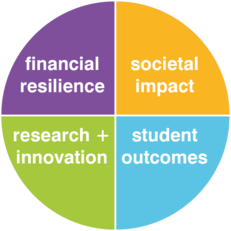Key to institutional success
Universities and colleges face unprecedented risk and uncertainty in the context of:
- global challenges like climate change and human migration
- political uncertainty and short-termism
- long-term sectoral challenges, such as pensions and tuition fees
- changes to key partnerships and funding
- increasing competition and focus on rankings
- rising costs and falling government grants
- tighter regulation and greater focus on students as consumers
- greater calls for transparency and accountability
Sustainable institutions are well placed to succeed in this environment because sustainability balances financial health alongside environmental and social concerns. It also takes a long-term view and embodies the holistic-thinking required to resolve this complex mix of demands.
Institutions that embed sustainability in their vision, mission and values can become more financially and operationally resilient, achieve better student outcomes, generate greater societal impact and deliver more world-leading research and innovation.
When developing a business case for a sustainability initiative, you should consider if it delivers benefits across these four pillars of success and, if so, how.
Ask yourself, what does your idea do for the institution? Does it…
- mitigate risk?
- increase competitiveness?
- reduce costs?
- improve reputation?
- attract and retain talented staff and students?
- meet or exceed regulatory requirements?
- stimulate innovation in learning, teaching or research?
- create additional opportunities for income generation?
Understanding the business benefits of your sustainability initiative is essential for explaining how it will deliver additional value for the organisation. This includes, but is not limited to, financial value.
The following examples illustrate how sustainability can benefit institutions across the four pillars of success. You may notice that these examples tend to provide cross-cutting benefits. In the case of the University of Salford’s Energy House, for example, generation of additional research income helps deliver world class research but it also contributes to the financial resilience of the organisation and the societal impact the University has through its research.





 Except where otherwise stated, content on this site is
licensed under a Creative Commons Attribution 3.0 License.
Except where otherwise stated, content on this site is
licensed under a Creative Commons Attribution 3.0 License.
